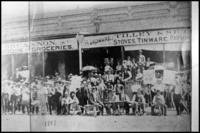The Progressive Era in Texas
Denton County History | Pilot Point History | Politics | Agriculture | Manufacturing
Reconstruction Era | Populism | Progressive Era | Political Parties | Politics in Pilot Point
The first two decades of Texas were marked by the Progressive Era. During this time, Texas pushed for prohibition, women’s suffrage, and the regulation of corporations.
Farmers during this time suffered from low profits and difficulty in accruing credit, so they held animosity towards eastern bankers and Wall Street. Tenant farming was a serious issue during the time, only furthering their economic woes.
Industry remained sparsely developed in Texas, the only significant industries were lumber, railroads, and oil. Thus, while Texans were suspicious of any corporate enterprise, they were especially suspicious of non-Texan ones. However, by the 1920s Texas was a place for corporate power.
Texas remained predominantly agricultural, but urbanization also began to take hold of the state. Texas cities became centers of progressivism as governmental innovators. They sought to end perceptions of governmental corruption through lowered taxes, weakening the influence of officials, and the use of commission governments. However, rapid urbanization fueled tensions over ideas of prohibition and the popularity of the Ku Klux Klan.
Proponents of women’s suffrage in Texas reorganized between 1912 and 1915 as the Texas Woman Suffrage Association. They gained strength from the national movement and World War I. Through their efforts to impeach Governor James “Pa” Ferguson, women’s suffrage proponents secured legislative approval of female voting in the 1918 Democratic primary. Voters denied the addition of amendment to the Texas State Constitution granting women’s suffrage in 1919. However, in June 1919, a special session of the Legislature ratified the 19th Amendment granting women’s suffrage nationally. Despite these gains, women remained mainly domestic outside of the voting booth.
Prohibition largely remained a non-issue in Texas politics until the Progressive Era. In 1887, voters denied a state-wide prohibition amendment to the state constitution and instead opted for local provisions banning alcohol. By 1893, the progress of local options banning alcohol worried liquor interests in the state and they formed the Texas Brewers Association in February 1901. Their involvement in politics convinced prohibitionists to take a more aggressive stance. The prohibition movement gained steam in 1907 when the Anti-Saloon League came to Texas. The Anti-Saloon League pushed for prohibition through the use of evangelical Protestant churches and intense lobbying of the Democratic party. Prohibition support was centered in North Texas among the rural, old-stock residents, whereas South Texas’ black, Hispanic, and German population opposed prohibition. The Texas State Legislature ratified the 18th Amendment, initiating nation-wide prohibition, in 1918, and Texas voters approved a prohibition amendment to the state constitution in 1919.
Ultimately the predominate issues of the Progressive Era were fought out within the Democratic party, as the Republican and other third parties held little power in the state. Additionally, the Progressive Era left Texas relatively unchanged – it was still rural, agricultural, and industry had yet to take hold and bring wealth to the state. However, it did begin the process of change in Texas – the government began to become more involved in economics, conservation, and social services; the Democratic party became more open to ideas of governmental participation; women had the right to vote; liquor was prohibited; and the national government became more involved in state affairs.
Citations:
Handbook of Texas, Texas State Historical Association, "Progressive Era," "Prohibition," http://tshaonline.org/handbook
